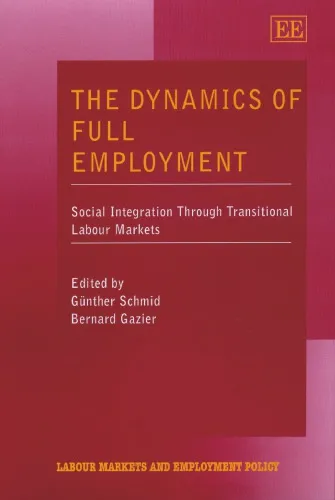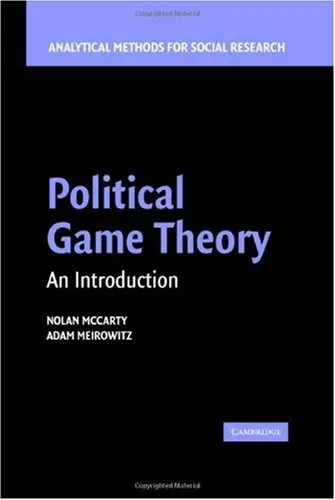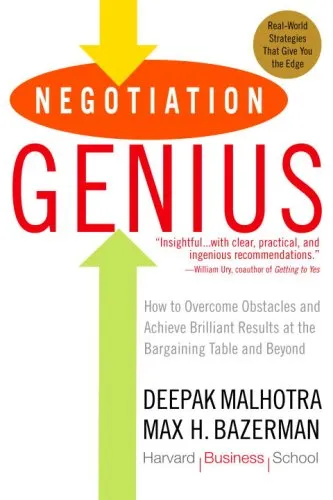The Dynamics of Full Employment: Social Integration Through Transitional Labour Markets (Labour Markets and Employment Policy)
3.8
Reviews from our users

You Can Ask your questions from this book's AI after Login
Each download or ask from book AI costs 2 points. To earn more free points, please visit the Points Guide Page and complete some valuable actions.Related Refrences:
Introduction
The Dynamics of Full Employment: Social Integration Through Transitional Labour Markets (Labour Markets and Employment Policy) authored by Gunther Schmid and Bernard Gazier, represents a significant milestone in the understanding of contemporary labour markets and their role in achieving societal goals like full employment and social cohesion. In a world of rapidly changing work environments, fluctuating economic conditions, and structural shifts in employment, this book provides a groundbreaking framework — the "Transitional Labour Market" (TLM) concept — that adapts to these evolving dynamics while ensuring both economic performance and strong social integration.
This work offers not just a theoretical lens to examine evolving labour market structures but also actionable policy insights on how transitions in the workforce can be managed. Whether it's aiding those transitioning between jobs, supporting work-life balance, or enabling lifelong learning, the book's focus on strategic interventions transforms the labour market into a dynamic space that positively influences both individuals and society at large.
Detailed Summary of the Book
What This Book Covers
At its core, The Dynamics of Full Employment challenges traditional perspectives on labour markets, employment policies, and the notion of "full employment." Schmid and Gazier argue that in modern economies, full employment does not simply mean minimizing unemployment rates. Instead, they introduce the concept of Transitional Labour Markets (TLMs), which emphasize continuous adaptation, mobility, and inclusion.
The book is built on the principle that transitions in the labour market—such as moving between jobs, balancing family and professional responsibilities, or transitioning into retirement—should be actively supported rather than treated as anomalies. The authors delve into five critical areas of labour market transitions: transitions between employment and unemployment, from education to work, between jobs, between work and personal/family life, and from work to retirement.
Combining rigorous research with practical insights, the authors present case studies, policy analysis, and innovative frameworks that illustrate how TLMs can be designed to foster resilience in the workforce. They argue that employment systems designed to accommodate change, flexibility, and lifelong learning are better equipped to achieve not just economic growth, but also greater equality, inclusion, and social integration.
Key Takeaways
- The concept of "full employment" must evolve beyond traditional interpretations to include transitional and flexible paths in modern labour markets.
- Transitional Labour Markets (TLMs) offer a solution to the challenges posed by job insecurity, skills gaps, and social exclusion.
- Policy interventions such as lifelong learning, active labour market policies, and institutional support for transitions are vital for achieving social cohesion.
- The integration of work-life transitions into labour market policies strengthens both individual well-being and economic performance.
- Collaboration among stakeholders — governments, businesses, and social institutions — is essential for building resilient and inclusive labour markets.
Famous Quotes from the Book
"The labour market must no longer be seen as a static space but rather as an evolving landscape where transitions are not anomalies, but essential stepping stones toward social and economic integration."
"Flexibility without security is chaos; security without flexibility is stagnation. The balance lies within transitional labour markets."
"Investing in people's ability to adapt to change is the bedrock of both individual prosperity and collective social progress."
Why This Book Matters
In an age where globalization, technological advancements, and economic crises are reshaping the nature of work, this book provides a timely model for navigating these changes. Unlike traditional views of labour markets that focus solely on employment versus unemployment, The Dynamics of Full Employment highlights the importance of transitions and flexibility.
This book matters because it reframes employment policies to address modern challenges like job instability, demographic shifts, and work-life balance. It provides clear, research-backed strategies for governments, corporations, and individuals aiming to create more inclusive and sustainable labour markets. Additionally, its emphasis on social cohesion as a policy outcome ensures that economic policies support not just growth, but also equity and integration.
Readers from diverse fields — policymakers, economists, sociologists, and even corporate leaders — will find practical value in the frameworks and policy suggestions offered. By adopting Schmid and Gazier's vision of a flexible yet secure labour market, societies can move closer to achieving the twin goals of economic dynamism and social solidarity.
Free Direct Download
You Can Download this book after Login
Accessing books through legal platforms and public libraries not only supports the rights of authors and publishers but also contributes to the sustainability of reading culture. Before downloading, please take a moment to consider these options.
Find this book on other platforms:
WorldCat helps you find books in libraries worldwide.
See ratings, reviews, and discussions on Goodreads.
Find and buy rare or used books on AbeBooks.
1325
بازدید3.8
امتیاز0
نظر98%
رضایتReviews:
3.8
Based on 0 users review
Questions & Answers
Ask questions about this book or help others by answering
No questions yet. Be the first to ask!













